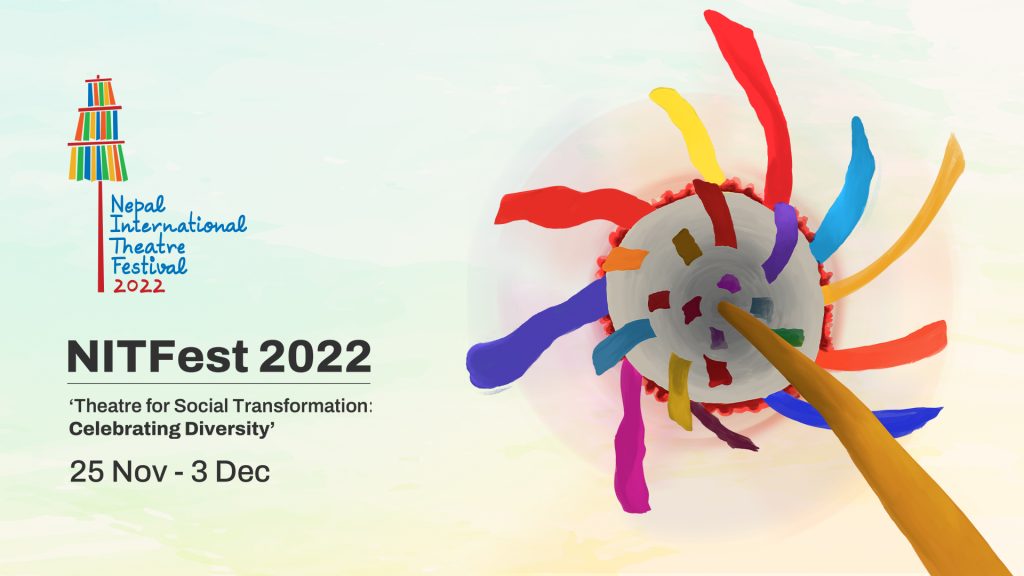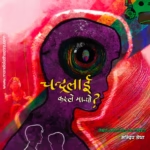The second iteration of the Nepal International Theatre Festival (NITFest) was held in Kathmandu from November 25 to December 2, 2022. With the encompassing theme of ‘Theatre for Social
Transformation: Celebrating Diversity,’ the festival showcased 18 plays from 12 different countries. Similarly, a series of organised workshops, master classes, interactions, and discussion programmes were also held during the nine-day festival.
NITFest boasted the participation of more than 200 theatre artists from Nepal, India, Bhutan, Argentina, the United Kingdom, Italy, Russia, Spain, Sri Lanka, the United States, and Uruguay. The opening ceremony of the festival was held on November 25 and was inaugurated by Jeevan Ram Shrestha, the minister of culture, tourism and civil aviation at the time. Prominent figures like veteran Indian actress Shabana Azmi, Civil Peace Service coordinator Stephanie Theis, Kathmandu Metropolitan City’s mayor Balendra Shah, Nepal Tourism Board’s official Laxman Gautam and festival director and chairperson of Mandala Theatre Srijana Subba were also present in the inauguration The festival concluded on December 3 in the presence of Janardan Sharma, former
minister of finance who appreciated and thanked Nepali theatre artists for organising such a vibrant event and creating a common platform to exchange Nepali art and theatrical practices with the international community. He also pledged government support to continue these types of events in the future.
The festival committee carefully selected the theatre productions based on their diverse styles, forms, genres and potential to reflect the socio political scenarios of local communities from different world regions. The opening play was a Nepali play titled ‘Katha Kasturi’ directed by Deeya Maskey, which presented a strong critique of capitalism, corruptpolitical establishment, greed and patriarchy. The play highlighted a folk tradition from the mid-western region of Nepal which is at the risk of obsoletetion because of several social and political situations.
A shadow puppet theatre, ‘Buddha ra Bhikhari’ directed by Anil Subba, depicted a tale from Buddhist philosophy. It incorporated live music and shadow effects to captivate audiences. After losing his precious means of sustenance, a homeless person begins his journey to visit Lord Buddha to understand more about sharing and fate. On his way, the homeless man finds the solutions to many existential questions.
Told as a concert theatre piece, ‘Desdemona Roopakam,’ directed by Abhishek Majumdar from India, examined feminist narratives within Shakespeare’s Othello and traditional Indian mythologies. Incorporating Hindustani and Carnatic folk music, the play depicted a brutal image of patriarchy in a global society.
A Spanish-Italian director-performer duo, Pablo Duran Rojas and Diana Costa, staged ‘Mr & Mrs Kraft’ where they invited the audience to enter a laboratory where they experiment with papers and masks. Their incredible effort took the audiences on a poetic and sensorial journey where the paper’s magic and its creatures trapped them in a continuous game of masking and unmasking.
A solo act by a Bhutanese-Nepali-American artist, Nima Bal, in collaboration with the director Katie Beck, ‘Three Countries, One Mother’ portrayed the real story of a family that was displaced from
their homeland during the Bhutanese refugee crisis in the 1990s and early 2000s. The play depicted the intergenerational trauma caused by displacement.
Based on a folk tale, ‘The Magic Swan Geese’, directed by Sukhorukova Tatiana from Russia, presented a story of a girl who is tasked with taking care of her brother in the absence of her parents. However, she gets carried away with her newfound freedom and forgets about her younger brother.
A Nepali production directed by Kiran Chamling Rai, ‘Khuwalung’ tells the story of a mythical stone, a symbol of Kirati civilisation. It depicts the history of a culture that evolved from a tribal to an ethnic community in Nepal. The play also critiques the apathy of contemporary society, which doesn’t value cultural icons and only focuses on materialistic development.
An experimental body performance directed by Kedar Nath Poudel, ‘Embryonic’, was a Nepali production from Pokhara. The play dealt with the human psyche with simple yet profound existential inquiries like the kind of opinions we cultivate and why we think the way we do.
Created and performed together by Uruguayan duo Andres Fagiolino and Betina Dominguez, ‘Rio’ was a clown performance with several aesthetic elements and a relevant storyline of a survival drama. ‘Rio’ presents a chaotic town during a great drought where two characters are sent to find water for their people.
Based on a Sinhala folk story, ‘Raja Man Wahala,’ directed by Chamika Hathlawatta from Sri Lanka, invited five storytellers on stage to narrate three stories. A combination of high-base percussion music, songs, rhythmic movement, and witty acts, the play invited the audience to choose the best hero after it exposed all of their fates.
Another well-appreciated solo performance created by the Italian duo, director Anna Dora Dorno and writer-actor Nicola Pianzola, ‘Made in ILVA’ told the story of a factory worker who is trapped in an isolating workplace. Based on real-life testimonies and poems from the workers at the ILVA steel plant in Taranto, the play critiqued the alienating nature of working in a factory setting and its impact on the environment and ordinary folks.
A play directed by Rajesh Singh from India, ‘Blackboard Land’, revolved around three people stuck in isolation at the peripheries of war in India. As the story progresses, the growing differences between the characters fuel the conflict that leads to physical violence.
A musical solo performance by Argentine performer Constanza Bithoff, ‘Nomad’, was a body performance through which the performer explored how the body reacts to changes. The performance illuminated the dimensions of change that occur in the body that breathes in simultaneous rhythms, manifesting in new times and spaces.
The closing performance was ‘Kubhindoko Katha’, a play directed by Dayahang Rai. The play was based on folklore from the far western region of Nepal, and it alluded to the differences in appearances, abilities and roles of individuals. The play argues that such diversities are nature’s plan to complement one’s weakness with another’s strength to ensure everyone plays a role—no matter how big or small—for the smooth functioning of this world. This play included sign language interpretation, audio descriptions, and dedicated wheelchair-accessible seats. It brought together disability sector professionals, artists, and theatre and development professionals to experience the play and observe the accessibility features.
Following its theme of diversity, the festivals also showcased three participatory play performances together and one forum theatre presentation.
A mixture of drama therapy and the theatre of the oppressed, ‘Shadow Liberation’ was a forum theatre shadow play facilitated by Evan Hasting. Utilising trauma-informed and research-based practice, the play raised awareness of sexual assault. Instead of giving an ideal resolution like in conventional plays, the play invited audience members to intervene constructively and non-violently in the given issue.
An ensemble of Nepali and Indian theatre artists presented a playback theatre show titled ‘Together and Alone’. Playback theatre is an improvisational form of community theatre where audience members are invited to share real-life experiences and stories to be played back theatrically, along with music, movement, and metaphor. The participants reflected on the stories that capture the essence of solitude, resilience, unity, pain, love, loss, and a range of varied emotions that they themselves have been experiencing during unpredictable times, mainly the Covid-19 pandemic.
Erin Mee, the India-based American theatre artist and educator, sent her site-specific audio play ‘Tree Confessions’ to the festival. This particular play was unique as audiences were asked to find a tree, sit under it (or nearby), and listen to the tree’s confessions while holding a plant. The recording reminisces on the symbiotic relationship between humans and nature. The audience was later invited to a virtual interaction with the director via Zoom.
Similarly, Khmer Community Development (KCD), a Phnom-Penh based NGO in Cambodia, presented the work they are doing through forum theatre for personal and group empowerment in Cambodian communities.
NITFest 2022 beyond the plays
Besides the plays and performances, the Nepal International Theatre Festival 2022 also featured other allied events such as master classes, workshops, panel discussions, open-air performances, book launches, award ceremonies, documentary screenings, etc., to initiate discussions and conversations on themes related to the core theme of the festival;
‘Theatre for Social Transformation: Celebrating Diversity.’ For the Master Class with Shabana Azmi, more than 200 participants joined to learn from the legendary veteran actress as she shared her insights and experiences in theatre and cinema. Hosting her was a rare opportunity to learn from one of the greats. Viplob Pratik, a Nepali poet, facilitated the masterclass.
Different workshops were organised to further facilitate learning and sharing. Senior theatre director Anup Baral and critic Anup Subedi ran a ‘theatre appreciation’ session. They shared insights into art criticism focusing on the history of theatre, acting, and criticism for fifteen up and-coming journalists.
Pallavi MD, Bindhumalini Narayanaswamy, and Nikhil Nagaraj from India conducted a workshop on devising Operatic Dramaturgy— focusing on working with music and text to create an operatic scene.
Pablo Duran Rojas and Diana Costa, the Spanish-Italian duo, conducted a workshop on the use of cardboard in theatre, giving special attention to recycling and recovery, where they taught tricks and techniques to give a second life to materials.
The ‘Accessibility and Inclusion in Art’ workshop was designed to inform and educate participants into creating ways to assimilate persons with disabilities as their audience, artists, and crew. Sagar Prasain, the founder of Diverse Patterns, led this workshop with Michelle Rolf, an expert from Birds of Paradise, a theatre group based in Scotland, UK.
Uruguayan duo Andres Fagiolino and Betina Dominguez conducted the ‘Presence and Vulnerability through Clown’ workshop focusing on the playful awakening of mischief, presence, state of urgency, and creativity.
Rose Schwietza, the American Nepali theatre practitioner, introduced participants to the Suzuki and Viewpoints methods of actor training, aiming to develop the actors’ connection to Earth. They were taught ways to balance lightness and control in the upper body, which, in turn, helps in becoming versatile and expressive.
Moreover, NITFest hosted many panel discussions to bring theatre related issues into the limelight. The first-panel discussion was called ‘Ma Ta Laligurans Bhayechu’, which translates to ‘I have become a Rhododendron’. Moderated by theatre artist Sarita Giri, the session invited veteran directors Birendra Hamal, Pushkar Gurung, and Bijay Bisfot to share the ups and downs of their long-term experiences in the theatre scene.
A joint panel, moderated by Damak-based artist Sijan Dahal, shed light on the challenges of Nepali theatre outside of Kathmandu. The panel included Sonu Jayanti (Itahari), Pariwartan (Pokhara), Suresh Sapkota (Butwal), and Hira Bijuli Nepali (Karnali).
For the discussion ‘Theatre Education: Possibilities and Challenges’, Shishir Upreti conversed with Prof. Dr. Abhi Subedi, Kusum Shakya, Dr Shiva Rijal (Dean of Tribhuvan University), and Khilanath Dhamala (Director of the Curriculum Development Centre), to explore the possible introduction of theatre education and its opportunities and challenges in Nepal.
In the panel discussion on theatre and criticism, writer and art critic Dhruba Satya Pariyar, theatre practitioners Kedar Shrestha and Namrata KC conversed with Suraj Subedi, a film/theatre critic, on the state of theatre criticism in Nepal.
Moderated by actor/director Khagendra Lamichhane, a panel discussion on theatre and cinema included notable speakers: acclaimed film director Min Bahadur Bham, actress Surakshya Panta, and actor Dayahang Rai. The speakers discussed the interconnectedness between theatre and cinema, their experience working under both mediums, and the impact of theatre on Nepali cinemas and vice versa.
The ‘From Text to Stage: Practices of Theatrical Adaptation’ panel was held alongside a book, Palpasa Cafe Play by Suraj Subedi, launch ceremony. Writer/journalist Basanta Basnet moderated the following panelists: writer and filmmaker Upendra Subba and directors Bimal Subedi and Deeya Maskey, who both had recently adapted the novels Palpasa Café and Sarpadansha, respectively, into plays.
For the event ‘Breath & Beat’, Rivers, Salil Subedi, and Navaraj Gurung, masters of Nepali overtones, didgeridoo, tabla, and percussion, weaved the Earth Stories with their gift of sound, music, and performing art, sending a powerful message that time is irreversible and the future of earth thrives in our breaths and beats.
Performance artist Rasik Raj and his team performed a piece titled Avashesh (The Fossils), reflecting the impacts of violence caused by armed conflict and war.
Namrata KC and her team from Aesthetic Dance Studio presented a dance performance titled ‘Journey of Footsteps’ as a part of an open-air symposium. The performance was an amalgamation of Kathak and other folk dances of Nepal depicting contemporary issues of women.
Nepali set designer for theatre, Hum BC—also a talented musician— collaborated with Madhav Tripathi to present an authentic Nepali instrumental performance during the festival. The performance was based on musical instruments that are near extinction in Nepal due to a lack of skilled musicians.
Different young poets from diverse places and genres, notably Anup Neupane, AJ Bob, Bhumika Tharu, Hiradevi Waiba, Kashiram Bajgain (Devbrat), Rasik Raj, and Saras Chari, recited their poems in tandem with the melody of the flute by Prashanna Humagain.
NITFest 2022 had two book launches planned as a part of its programme. One was ‘Indradhanush’, a playbook developed under Mandala Theatre’s five-month ‘Playwriting Project 2022’. The book includes seven plays written by local playwrights selected from seven provinces of Nepal. The second book launch was writer/critic Suraj Subedi’s drama adaptation of the bestselling Nepali novel ‘Palpasa Café’ (originally written by Narayan Wagle).
In this iteration, the NITFest Innovative Idea Award was awarded to actor-director Sarita Sah for her initiative to develop and run a theatre programme with women from remote areas of Madhesh province. The award was initially established to recognise young and dedicated individuals who are the proponents of outstanding and innovative ideas that bring about substantial improvements in the areas of theatre writing, directing, producing, teaching, learning, research, community services, art management, and administrative affairs.
The documentary ‘Mandala Drama School: Theatre for Social Change, Conflict Transformation, and Peacebuilding’ was premiered and screened during the festival. The video documentary by Mandala’s peace-building team and Foto Crystal documented the impressions of the first drama school graduates.
Similarly, a mini tutorial series on disability and arts produced by Scotland-based theatre professional Ramesh Meyyappan was also screened. Delivered in British sign language (BSL) and Nepali sign language (NSL), alongside English captions, five videos were displayed in a loop as a part of the festival’s thematic concern and capacity-building component.
NITFest 2022 aimed to open its doors to everyone and create an environment where everybody embraces a sense of belonging. With the support of GIZ/ZFD, selected yet diverse theatre productions, and programmes that prioritised different forms of artistic expression were included based on their aesthetic value and sense of social responsibility.
The festival also tried its best to be an environmentally friendly event. Acknowledging the global environmental crisis, organisers not only made a deliberate effort to recycle and reuse materials but also reduced the use of plastic and paper when it came to branding and distributing; printouts were limited, and all the documents and flyers were made available digitally. The audiences for ‘Tree Confessions’, a site-specific theatre play, received seeds and plants per the play’s theme. World Bank Group supported the festival’s environment-friendly approach.
The NITFest 2022 also aimed to create an environment where everybody has the equal opportunity to participate in the festival to the best of their abilities and desires. For this, it partnered with Diverse Patterns and the British Council to implement accessible features—venues were made wheelchair accessible, and the opening event and four Nepali plays had sign language interpretation and audio description features. Similarly, tickets were waived for people with disabilities, and a dedicated workshop on disability inclusion in arts was conducted. Over a hundred people with some form of disability attended the festival and utilised the accessibility features. Additionally, around forty art professionals engaged in a workshop about how art and art-related programmes can
be accessible to audiences with disabilities. Since then, the organisation ‘Diverse Pattern’ has developed a toolkit through the British Council’s support to shed light on issues of accessibility in art spaces. It is available to art professionals who can use it as a guide to making their work accessible to audiences and participants with disabilities.
With all the activities, events and programmes, NITFest 2022 attempted to strengthen communal harmony and social diversity and contribute to preserving intangible cultural heritage through social awareness, art, and exchange. It served as a platform for global theatre groups and artists to come together on a shared platform and explore their aesthetic expressions and solidarity for relevant socio-political issues.
More importantly, this iteration of the festival invited a community of audiences not considered by Nepal’s art sector. This approach not only opened up the theatre space to people with disability but also helped the festival become more relevant to society.






